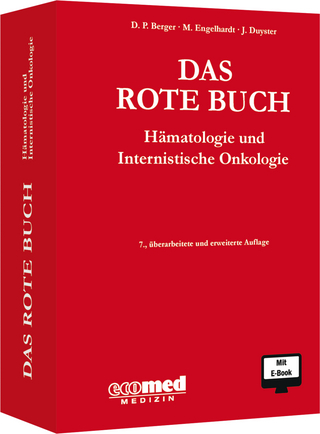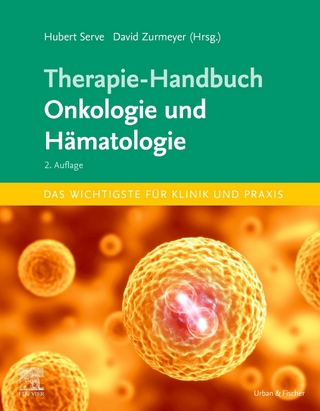
Multiple Myelomas
An Issue of Hematology / Oncology Clinics
2007
Saunders (Verlag)
978-1-4160-5082-7 (ISBN)
Saunders (Verlag)
978-1-4160-5082-7 (ISBN)
- Titel ist leider vergriffen;
keine Neuauflage - Artikel merken
Describes advances in molecular pathogenesis of multiple myeloma (MM) due to comparative genomic hybridization, gene microarray, and proteomic profiling of MM cells. This work also describes advances in the pathogenesis of bone disease in MM.
Although treatable with conventional and high dose therapies, multiple myeloma (MM) remains incurable. However, recent advances in oncogenomics, coupled with increased understanding of the role of the bone marrow (BM) microenvironment in MM pathogenesis, has provided the basis for a new treatment paradigm targeting the tumor cell in the BM milieu to overcome conventional drug resistance and improve patient outcome. This text will first describe advances in molecular pathogenesis of MM due to cutting edge comparative genomic hybridization, gene microarray, and proteomic profiling of MM cells. The molecular basis for the growth, survival, drug resistance, and migration of MM cells, including extracellular matrix proteins, BM stromal cells, and cytokines in the BM milieu, will next be delineated using both laboratory and animal model systems. Importantly, recent advances in the pathogenesis of bone disease in MM will be described. These preclinical studies all will set the stage for the bench to bedside translation of scientific advances to the clinic to improve patient outcome. The clinical approach to patients with plasma cell dyscrasias has been transformed in the past 5 years.
There are now uniform definitions of monoclonal gammopathy of unclear significance and improved predictors of who will develop MM. Biologically-based prognostic factors form the basis for new staging systems predictive of patient outcome. The approach to the patient with newly diagnosed, relapsed, and relapsed refractory MM has been transformed, with improved overall and extent of response as well as progression-free and overall survival, in both transplant candidates and elderly patients. Novel targeted therapies and immune-based strategies hold great promise to enhance treatment options even further. Finally our ability to identify, prophylax, and treat complications of MM and its treatment has advanced in a parallel fashion. Myeloma therefore represents a novel treatment paradigm targeting the tumor cell, tumor host interaction, and tumor microenvironment which can serve as a model to outcome in patients with other hematologic cancers and solid tumors as well.
Although treatable with conventional and high dose therapies, multiple myeloma (MM) remains incurable. However, recent advances in oncogenomics, coupled with increased understanding of the role of the bone marrow (BM) microenvironment in MM pathogenesis, has provided the basis for a new treatment paradigm targeting the tumor cell in the BM milieu to overcome conventional drug resistance and improve patient outcome. This text will first describe advances in molecular pathogenesis of MM due to cutting edge comparative genomic hybridization, gene microarray, and proteomic profiling of MM cells. The molecular basis for the growth, survival, drug resistance, and migration of MM cells, including extracellular matrix proteins, BM stromal cells, and cytokines in the BM milieu, will next be delineated using both laboratory and animal model systems. Importantly, recent advances in the pathogenesis of bone disease in MM will be described. These preclinical studies all will set the stage for the bench to bedside translation of scientific advances to the clinic to improve patient outcome. The clinical approach to patients with plasma cell dyscrasias has been transformed in the past 5 years.
There are now uniform definitions of monoclonal gammopathy of unclear significance and improved predictors of who will develop MM. Biologically-based prognostic factors form the basis for new staging systems predictive of patient outcome. The approach to the patient with newly diagnosed, relapsed, and relapsed refractory MM has been transformed, with improved overall and extent of response as well as progression-free and overall survival, in both transplant candidates and elderly patients. Novel targeted therapies and immune-based strategies hold great promise to enhance treatment options even further. Finally our ability to identify, prophylax, and treat complications of MM and its treatment has advanced in a parallel fashion. Myeloma therefore represents a novel treatment paradigm targeting the tumor cell, tumor host interaction, and tumor microenvironment which can serve as a model to outcome in patients with other hematologic cancers and solid tumors as well.
| Erscheint lt. Verlag | 12.12.2007 |
|---|---|
| Reihe/Serie | The Clinics: Internal Medicine ; v. 21-6 |
| Zusatzinfo | Illustrations (some col.), port. |
| Verlagsort | Philadelphia |
| Sprache | englisch |
| Themenwelt | Medizinische Fachgebiete ► Innere Medizin ► Hämatologie |
| ISBN-10 | 1-4160-5082-5 / 1416050825 |
| ISBN-13 | 978-1-4160-5082-7 / 9781416050827 |
| Zustand | Neuware |
| Haben Sie eine Frage zum Produkt? |
Mehr entdecken
aus dem Bereich
aus dem Bereich
Hämatologie und Internistische Onkologie
Buch | Softcover (2023)
ecomed-Storck GmbH (Verlag)
129,99 €
Buch | Softcover (2024)
Urban & Fischer in Elsevier (Verlag)
54,00 €
Buch | Softcover (2023)
Deutscher Ärzteverlag
29,99 €


